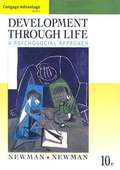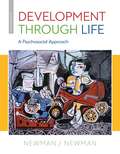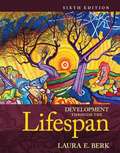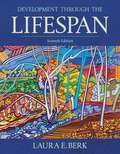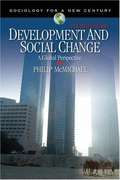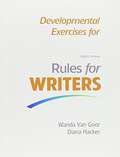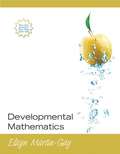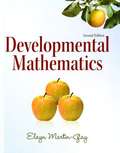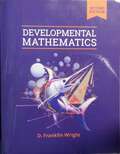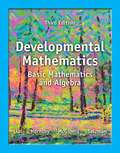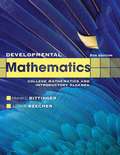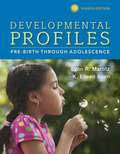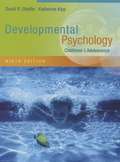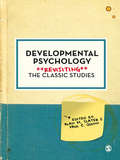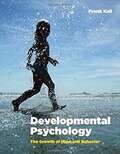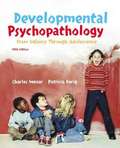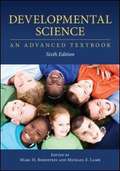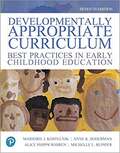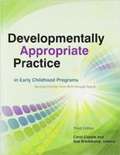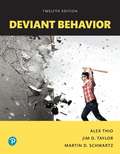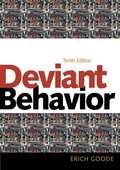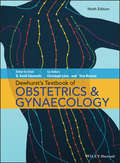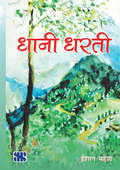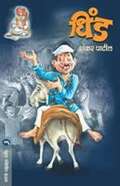- Table View
- List View
Development Through Life: A Psychosocial Approach (10th edition)
by Barbara M. Newman Philip R. NewmanDesigned for an undergraduate course in human development, this textbook describes the physical, intellectual, social, and emotional growth that occurs in each of 11 life stages. Its psychosocial approach emphasizes the continuous interaction and integration of individual competencies with the demands and resources of the surrounding culture. The ninth edition features a new chapter on death, dying, and bereavement. A glossary of terms completes the volume.
Development Through Life: A Psychosocial Approach (Twelfth Edition)
by Barbara M. Newman Philip R. NewmanNewman and Newman use a chronological approach to present development across the life span, drawing on the psychosocial theory of Erik Erikson to provide a conceptual framework for the text. The authors address physical, intellectual, social, and emotional growth in all life stages, focusing on the idea that development results from the interdependence of these areas at every stage, and placing special emphasis on optimal development through life.
Development Through the Lifespan (6th Edition)
by Laura E. BerkLaura Berk's Development Through the Lifespan is relied upon in classrooms worldwide for its clear, engaging writing style, exceptional multicultural and cross-cultural focus, cutting-edge consideration of the interrelationships between heredity and environment, rich examples, and long-standing commitment to presenting the most up-to-date scholarship. This new edition continues to offer students research-based practical applications that they can relate to their personal and professional lives. Laura Berk, renowned professor and researcher, has revised the text with new pedagogy, a heightened emphasis on the interplay between heredity and environment, and an enhanced focus on many social policy issues, while emphasizing the lifespan perspective throughout. The latest theories and findings in the field are made accessible to students in a manageable and relevant way. Berk's signature storytelling style invites students to actively learn beside the text's "characters." Students are provided with an especially clear and coherent understanding of the sequence and underlying processes of human development, emphasizing the interrelatedness of all domains--physical, cognitive, emotional, social--throughout the text narrative and in special features. Berk also helps students connect their learning to their personal and professional areas of interest. Her voice comes through when speaking directly about issues students will face in their future pursuits as parents, educators, health care providers, social workers, and researchers. As members of a global and diverse human community, students are called to intelligently approach the responsibility of understanding and responding to the needs and concerns of both young and old. While carefully considering the complexities of human development, Berk presents classic and emerging theories in an especially clear, engaging writing style, with a multitude of research-based, real-world, cross-cultural, and multicultural examples. Strengthening the connections among developmental domains and of theory and research with applications, this edition's extensive revision brings forth the most recent scholarship, representing the changing field of human development.
Development Through the Lifespan: 7th Edition
by Laura E. BerkUnparalleled Among Human Development Texts — In a Class by Itself <P><P>With its seamless integration of up-to-date research, strong multicultural and cross-cultural focus, and clear, engaging narrative, Development Through the Lifespan has established itself as the market’s leading text. The dramatically revised Seventh Edition presents the newest, most relevant research and applications in the field of human development today. Featuring compelling topics, rich examples, and author Laura Berk’s signature storytelling style, this new edition is the most current and engaging text available. <P><P>Available to package with Development Through the Lifespan, Seventh Edition, MyLab™ Human Development is an online homework, tutorial, and assessment program designed to work with this text to further engage students and improve learning. MyLab Human Development is ideal for courses requiring robust assessments. <P><P>Development Through the Lifespan, Seventh Edition is also available via Revel™, an interactive digital learning environment that is a less expensive alternative to the print textbook, enabling students to read, practice, and study in one continuous experience. Revel’s new mobile app lets students access and interact with their text anywhere, anytime, on any device, giving students the flexibility of toggling between their phone, tablet, and laptop as they move through their day.
Development and Social Change: A Global Perspective (4th Edition)
by Philip McmichaelThis edition describes the dramatic acceleration of the global and political economy across three historical periods: colonialism, the development era, and the current era of globalization. Filled with case studies, this text makes the intricacies of globalization concrete, meaningful, and clear for students and moves them away from simple social evolutionary views, encouraging them to ponder social change, development, and global inequalities.
Developmental Exercises For Rules For Writers
by Diana Hacker Nancy SommersTo learn any skill--whether snowboarding, tennis, CPR, Web design, or the electric guitar--takes practice. Writing well is no exception: In a college composition class, you will learn to write by writing, and you will learn to revise by revising. Developmental Exercises for Rules for Writers, Eighth Edition, will sharpen your revision skills by giving you a great deal of controlled, yet realistic, practice.
Developmental Mathematics
by K. Elayn Martin-GayDevelopmental Mathematics is a new addition to the Martin-Gay work text series and is intended for a 2-3 semester sequence of Basic Math,Introductory Algebra and Intermediate Algebra. The text provides complete coverage for basic mathematics and introductory algebra courses and with the appendices ("further topics in algebra") it provides the necessary intermediate algebra topics. The Whole Numbers; Multiplying and Dividing Fractions; Adding and Subtracting Fractions; Decimals; Per¢ Geometry; Statistics and Probability; Real Numbers and Introduction to Algebra; Equations, Inequalities, and Problem Solving; Graphing Equations and Inequalities; Systems of Linear Equations; Exponents and Polynomials; Factoring Polynomials; Rational Expressions; Roots and Radicals; Quadratic Equations and Nonlinear Graphs; Further Algebraic Topics; Tables; The Bigger Picture; Further Geometric Topics; Inductive and Deductive Reasoning; Sample THEA Test For all readers interested in developmental mathematics.
Developmental Mathematics (Second Edition)
by Elayn Martin-GayElayn Martin-Gay firmly believes that every student can succeed, and her developmental math textbooks and video resources are motivated by this belief. Developmental Mathematics, Second Edition was written to help readers effectively make the transition from arithmetic to algebra. The new edition offers new resources like the Student Organizer and now includes Student Resources in the back of the book to help students on their quest for success.
Developmental Mathematics 2e Textbook And Software Bundle
by Hawkes LearningDevelopmental Mathematics 2e Textbook
Developmental Mathematics: Basic Mathematics And Algebra
by Margaret L. Lial John Hornsby Stanley Salzman Diana Hestwood Terry McGinnisThe Lial Series has helped thousands of students succeed in developmental mathematics by providing the best learning and teaching support to students and instructors.
Developmental Mathematics: College Mathematics and Introductory Algebra (8th Edition)
by Marvin L. Bittinger Judith A. BeecherThe Bittinger series changed the face of developmental education with the introduction of objective-based work texts that presented math one concept at a time. This approach allowed readers to understand the rationale behind each concept before practicing the associated skills and then moving on to the next topic. With this revision, Marv Bittinger continues to focus on building success through conceptual understanding, while also supporting readers with quality applications, exercises, and new review and study materials to help students apply and retain their knowledge.
Developmental Profiles: Pre-Birth Through Adolescence (Eighth Edition)
by Lynn R. Marotz K Eileen AllenDesigned to help you comprehend the complexity of child development, DEVELOPMENTAL PROFILES: PRE-BIRTH THROUGH ADOLESCENCE, Eighth Edition, highlights major characteristics for each of the developmental domains in a concise, non-technical, point-by-point format. The book covers the full range of stages in child and adolescent development, highlighting important safety considerations at each developmental stage. This edition provides extensive information that teachers, families, and service providers will find useful for promoting individualized learning and identifying developmental delays in their earliest stage. It integrates current research and theory throughout, and emphasizes the importance of working collaboratively with diverse families to achieve maximum benefit for children. Both preservice and practicing teachers will turn to this excellent reference over and over again for comprehensive, easy-to-find information about each stage of development.
Developmental Psychology: Childhood And Adolescence (Ninth Edition)
by David R. Shaffer Katherine KippThis popular, topically organized, and thoroughly updated child and adolescent development text presents you with the best theories, research, and practical advice that developmentalists have to offer today. Authors David R. Shaffer and Katherine Kipp provide you with a current and comprehensive overview of child and adolescent development, written in clear, concise language that talks "to" you rather than "at" you. The authors also focus on application showing how theories and research apply to real-life settings. As a result, you will gain an understanding of developmental principles that will help you in your roles as parents, teachers, nurses, day-care workers, pediatricians, psychologists, or in any other capacity by which you may one day influence the lives of developing persons. Available with InfoTrac Student Collections http://gocengage. com/infotrac.
Developmental Psychology: Revisiting the Classic Studies (Psychology: Revisiting the Classic Studies)
by Alan M. Slater Paul C. QuinnThis book revisits classic studies in developmental psychology with a view to showing not only how they shaped the field, but also how the field has itself moved on through engagement with the issues these studies raise. It engages critically with the studies in order to reveal new ways of thinking both about them and about the ideas they explore. In effect, it shows how developmental psychology can be - and has been - taken forward in exciting ways through a careful re-examination of the core studies that lie at its heart.<P><P> The volume's chapters are written by internationally renowned scholars who are working at the cutting edge of the areas mapped out by particular classic studies and whose work has been heavily influenced by a deep appreciation of the research that they write about. As a result, the chapters give readers profound insights into the foundations of developmental psychology, but also show how the discipline has advanced in important ways in the years since those studies were conducted.<P> Written in an accessible and engaging style, each chapter uses a similar structure to explore a particular classic study and the topic it relates to. All the chapters start by locating the studies within their social and historical context - identifying the concerns that motivated researchers, and the particular perspective that informed their scientific thinking. The studies' methods and findings are then presented. This is followed by a discussion of the studies' impact, before concluding with a consideration of the way in which, from the time that they were conducted, the field has moved beyond the classic studies. The result is a volume which is not only enjoyable and informative to read, but one that should support developmental psychology courses at any level.
Developmental Psychology: The Growth of Mind and Behavior
by Frank KeilClear, compelling, and authoritative. <p><p> Frank Keil’s Developmental Psychology represents his vision of how psychology should be taught and is based on nearly four decades of teaching a lecture course in developmental psychology and conducting developmental research. <p><p>With a cohesive narrative, clear art program, and carefully crafted pedagogy, the book guides students through material that is as rich as it is intriguing. Keil’s narrative reflects his passion for engaging students’ intellectual curiosity with an analytical approach that explores the big questions, links theory with evidence, and treats developmental psychology as a science. <p><p>Developmental Psychology invites readers to celebrate the beauty and to understand the depth of psychological development.
Developmental Psychopathology (Fifth Edition)
by Charles Wenar Patricia KerigThis accessible, clearly written text approaches child psychopathology as "normal development gone awry" and encourages students to "think developmentally" about psychopathology, from childhood through adolescence. The fifth edition includes cutting-edge research, improved organization, and new coverage of problems that arise in late adolescence/early adulthood.
Developmental Science: An Advanced Textbook,
by Marc H. Bornstein Michael E. LambNoted as one of the most comprehensive textbooks in the field, Developmental Science, 6th Edition introduces readers to all of areas in developmental psychology: neuroscience, genetics, perception, cognition, language, emotion, self, and social interaction. Each of the world-renowned contributors masterfully introduces the history and systems, methodologies, and measurement and analytic techniques used to understand the area of human development under review. The relevance of the field is illustrated through engaging applications in each chapter. As a whole, this highly-respected text illuminates substantive phenomena in developmental science, its applications across the life span, and its relevance to everyday life. Each chapter has been substantially revised for this new edition to reflect the current state of the field and the new edition is now accompanied by a website. Students and instructors will find chapter outlines, topics to think about before reading the chapters, a glossary, and suggested readings with active reference links on the website. Electronic access to the text's figures and tables, suggestions for classroom assignments and/or discussion, and a test bank with multiple-choice, short answer, and essay questions is limited to instructors only. Two new chapters highlight many modern developments. Each chapter features an introduction, up-to-date overviews of the field, summary and conclusion, and numerous classical and contemporary references. The book opens with an overview of developmental science -- its history and theory, the cultural orientation to thinking about human development, and the manner in which empirical research is designed, conducted, and analyzed. Part 2 focuses on the field's major substantive areas: neuroscience and genetics, physical and motor skills, perception, and cognitive and language development. Part 3 examines personality and social development within the context of the various relationships and situations in which developing individuals function and by which they are shaped. The book concludes with a new chapter on the latest applications of developmental science. Ways in which developmental thinking and research affect and are affected by practice and social policy are particularly emphasized. Used primarily as a graduate level text for courses on developmental psychology/science, life span, and/or human development, the book can also be used at the advanced undergraduate level. Researchers interested in staying abreast of the latest developments in the field also appreciate the book's comprehensive nature.
Developmentally Appropriate Curriculum: Best Practices in Early Childhood Education
by Marjorie Kostelnik Anne Soderman Alice Whiren Michelle RupiperDevelopmentally Appropriate Curriculum: Best Practices in Early Childhood Education is an all-in-one guide that brings together everything pre-service teachers need to implement an integrated, developmental approach to curriculum-based instruction. <p><p> The 7th Edition addresses all aspects of classroom life–conceptualization, planning, implementation, and evaluation–for children ages three through eight. This comprehensive, cohesive approach emphasizes the “how” of curriculum development, as well as the “what and why.” With practical, research-based guidelines, sample activities and lesson plans for each curriculum domain, and a focus on teaching methods, readers have the tools they need to translate theory into age-appropriate practice that accommodates individual, social, and cultural differences.
Developmentally Appropriate Practice in Early Childhood Programs: Serving Children from Birth through Age 8
by Carol Copple Sue BredekampThe core of this book is eight chapters that address the periods of early childhood--The Infant and Toddler Years (Ages 0-3); The Preschool Years (Ages 3-5), The Kindergarten Year (Ages 5-6), and The Primary Grades (Ages 6-8).
Deviant Behavior
by Jim Taylor Martin Schwartz Alex ThioThis new edition of Deviant Behavior is designed to make teaching and learning as interesting and rewarding as possible. Deviant behavior is already by itself an exciting subject, but the authors have tried to make it more exciting with a simple, lively, and engaging style of writing. No matter how complex and dry the theories and data about deviance may appear in scholarly journals, government reports, and most books, here they are presented in a fresh, straightforward style, with vivid and real-life contexts. In addition, stimulating, ironic, and thought- provoking remarks are often thrown in to make the book come alive.
Deviant Behavior (10th Edition)
by Erich GoodeA comprehensive study of the behavior, beliefs, conditions, and reactions to deviance, giving students a better understanding of this phenomenon. Deviance is discussed from the sociological perspectives of positivism and constructionism. Readers will grasp the reason behind deviant behavior through the positivist perspective and why certain actions, beliefs, and physical characteristics are condemned through the constructionist perspective.
Dewhurst's Textbook of Obstetrics & Gynaecology 9th edition
by Keith EdmondsThis classic textbook continues to provide the basic knowledge relevant to the practice of obstetrics and gynaecology. Comprehensive in scope, Dewhurst’s Textbook of Obstetrics & Gynaecology offers contributions from a noted panel of experts and contains an integrated approach that is designed to help deliver the highest possible care to patients.
Dhani Dharati
by Ishaan Mahesh“धानी धरती—श्री ईशान महेश का बाल-उपन्यास है। इसका केंद्रभूत विषय पर्यावरण के लिए सजगता और बाल-सुलभ उत्साह है। यह पुस्तक उपन्यास के रूप में पर्यावरण रक्षा के तमाम बिंदुओं को रोचक तरीके से प्रस्तुत करने की दृष्टि से बेहद उपयोगी है।
Dharmashastracha Ithihas Purvardha: धर्मशास्त्राचा इतिहास पूर्वार्ध
by Yashwant Abaji Bhatभारतरत्न महामहोपाध्याय डॉ. पांडुरंग वामन काणे ह्यांनी इंग्रजी भाषेत लिहिलेल्या ‘History of Dharmashastra’ ह्या विस्तृत आणि विद्वत्तापूर्ण ग्रंथाच्या मराठीमध्ये केलेल्या सारांश स्वरूपाच्या अनुवादाचा पूर्वार्ध मराठी वाचकांपुढे सादर करण्यात आला आहे. “भारतामधील चालीरीतींमध्ये जे फेरबदल घडून आले आहेत त्यांच्या संबंधी, त्याचप्रमाणे भारतीय समाजरचनेमध्ये झालेल्या स्थित्यंतराविषयी आणि सामान्यतः कालानुक्रमाविषयी शास्त्रीवर्गात चमत्कारिक भावना प्रचलित आहेत आणि शास्त्रीवर्गाचे भारतातील सामान्य जनसमुदायावर फार मोठे वजन आहे ह्याकरिता ह्या ग्रंथाचे संस्कृत भाषेत आणि मराठी भाषेमध्ये भाषांतर केले आहे. “धर्मशास्त्राच्या विशिष्ट विषयांचे विवेचन करणारी उत्कृष्ट पुस्तके प्रख्यात विद्वानांनी जगाला सादर केली आहेत. तथापि, कोणत्याही एका लेखकाने समग्र धर्मशास्त्राची चिकित्सा करण्याचा आतापर्यंत प्रयत्न केलेला नाही. त्या दृष्टीने पाहिल्यास हा ग्रंथ त्या विषयावरील अग्रेसर ग्रंथाच्या स्वरूपाचा आहे.
Dhind FYBA - SPPU: धिंड एफ.वाय.बी.ए. - सावित्रीबाई फुले पुणे यूनिवर्सिटी
by Shankar Patil“म्या दारूला शिवलो न्हाई. शप्पत सांगतो, मी घेतल्याली न्हाई. उगा इनाकारणी माज्यावर अदावत घेऊ नका.” राऊ खोतानं साफ झिडकारलं तशी ती सारी चावडी खालवर झाली. लोक खदाखदा हसू लागले आणि राऊ खोतच म्हणाला, “हसून दावू नका. खरं सांगतो. मी घेतल्याली न्हाई.” रामभाऊ हसून म्हणाले – “गड्या, तुझ डोळं सांगत्यात की रं!” “अण्णा, डोळं काय सांगत्यात? गपा, उगच गप्प् बसा.” “उतरंस्तवर गप् बसावं म्हणतोस व्हय राऊ?” “अहो, काय चढलीया काय मला?” “अजून चढली न्हाई म्हणतोस?” “अहो, त्याचं नावसुदिक घेऊ नगा. शिवल्याला न्हाई म्या त्याला!” एक सनदी पुढं झाला आणि मोठ्यानं म्हणाला, “शिवल्यालं न्हाई, तर मग दडून का बसला होतास?” “शेबास! मी काय दडून बसलो होतो काय?” “दडला नव्हतास तर मग माळ्यावर काय करत होतास?” “माळ्यावर काय करतोय! गडद झोपलो होतो?” “मग खाली जागा नव्हती काय?” “ते तुम्हाला काय करायचं? आम्ही खाली झोपू न्हाईतर वर झोपू!” राऊ असं आडवं बोलला आणि सबंध चावडी पोट धरून हसू लागली.
